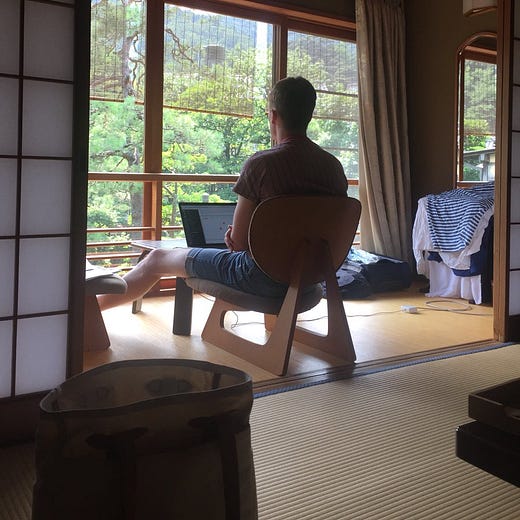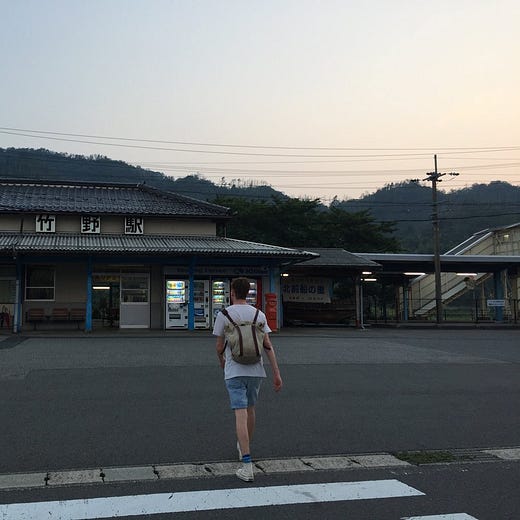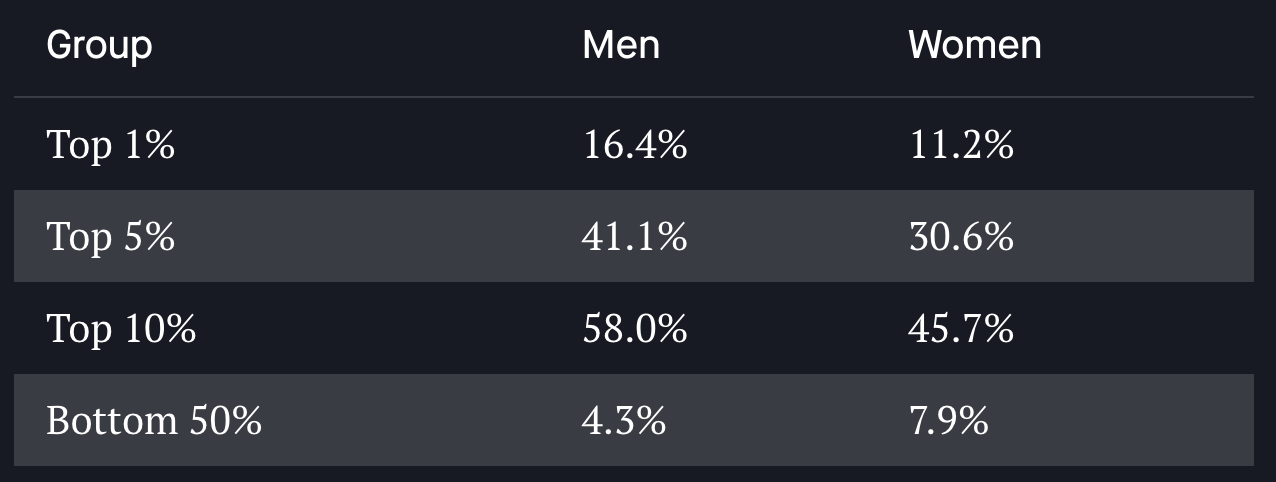The Long Game 76: Human Performance, Efficiency, Discovering New Ideas, Do Design
📉 Dating Statistics, Ethereum, Covering the Desert with Solar Panels, Space Travel, and Much More!
Hi there, it’s Mehdi Yacoubi, co-founder at Vital, and this is The Long Game Newsletter. To receive it in your inbox each week, subscribe here:
📣 We are hiring at Vital, help us build the “Strava for Health.” We are now looking for:
Senior Backend Engineer
Senior Frontend Engineer (Flutter)
Senior Designer
We are offering $1,000 in Bitcoin if you refer to us a candidate we end up hiring.
In this episode, we explore:
Resources on human performance, building muscle and strength training
The errors of efficiency
Discovering new ideas
Do Design
Dating statistics
Covering the Sahara with solar panels
Let’s dive in!
🥑 Health
📖 Learn About Human Performance, Nutrition, Physiology, Strength & Conditioning
After too many months without a gym during the lockdowns, I’ve been back to intense training for the last three months, and I love it. When I train a lot, I like to learn about how to optimize performance.
I’m currently doing a 12-week focused period on bodybuilding to regain the muscle I had lost (and add more!) After that, I’ll switch to 12 weeks with a focus on strength (powerlifting movements.) I find that switching between different priorities helps to stay highly motivated in the pursuit of improvement.
A great resource to learn more about these topics that Andrew Huberman recommended is the Lab of Andy Galpin.
Some other resources I recommend:
John Meadows (RIP 🙏)
🌱 Wellness
🛣 The Errors of Efficiency
Efficiency is a trap. After building the whole society around it, we finally start to understand it.
This article argues that efficient doesn’t necessarily mean effective. It argues that more productive doesn’t necessarily mean more powerful. And it argues that being mass, ignored and expensive are not points of weakness but, in fact, points of strength.
The author makes the case against efficiency in the marketing/advertising world, but it can also be applied in life in general.
🧠 Better Thinking
💡 Discovering New Ideas > Being Smart
Paul Graham wrote about an important idea recently. He explains that the ability to discover new ideas is more important than being smart. There is a ‘cult of smart’ in society that makes us value the wrong things:
If you asked people what was special about Einstein, most would say that he was really smart. Even the ones who tried to give you a more sophisticated-sounding answer would probably think this first. Till a few years ago I would have given the same answer myself. But that wasn't what was special about Einstein. What was special about him was that he had important new ideas. Being very smart was a necessary precondition for having those ideas, but the two are not identical.
It may seem a hair-splitting distinction to point out that intelligence and its consequences are not identical, but it isn't. There's a big gap between them. Anyone who's spent time around universities and research labs knows how big. There are a lot of genuinely smart people who don't achieve very much.
So discovering new ideas is more important than being intelligent. What’s the best way to do it?
obsessive interest in a particular topic
independent-mindedness
working on your own projects
working hard
sleep, avoiding bad stress, finding the right people
and finally: the writing ability
It means we have more agency to do great things than if it was only dependant on being smart (IQ — mainly genetics.)
Paul Graham ends the essay here, but I can already imagine the following steps: many of those other things could be genetics as well: agency, the ability to work hard, etc. This debate can easily be circular and always end up with the same conclusions!
+
⚡️ Startup Stuff
👨🎨 Do Design — Why Beauty is Key to Everything
I am not a designer nor an artist, but I’ve been obsessed with products masterfully designed for a long time. I always think that beauty and superior design is a long-term winning strategy because it creates an indescribable feeling of love from the user. After I tweeted this, Sandor recommended Do Design by Alan Moore. I listened to the book over the weekend.
“The Shakers also have one golden rule – back to William Morris: Do not make that which is not useful. And so it was their interpretation that all useful things should also be beautiful. God, as architect Mies van der Rohe said, was in the details and, you never know, an angel may come one day and sit on that chair – it had to be worthy of such an event.”
A crucial part of designing better products is a curiosity about the world that surrounds you.
“With your depth of field and curious soul, allowing something to evolve or to see meaning in playful accidents can make the difference between creating the same old thing, or something that is unique, valuable, lasting, beautiful.”
In terms of masterfully designed apps, Endel and Notion come to mind. At Vital, we aspire to be one of the most beautifully designed mobile apps in the world.
A little bit related to this, I re-read this article by John Palmer on the need to update the playbook of early products:
There's something about the startup playbook of the past decade that is doesn't seem right anymore. Namely, it feels more than ever like a linear track to follow, where product quality has been de-emphasized. I'm not the first to write about this, but recently it has seemed more true than ever.
More specifically, the famous ‘build anything and just ship fast’ might need a rephrasing:
MVP Thinking
For the past decade, the prevailing startup playbook has been to build an MVP, ship it early, and then iterate your way to success. But the environment in which we build products has evolved quite a bit.
Today, there's so much capital in the startup ecosystem, and so many tools that make it cheap and easy to ship a product, that baseline applications have become a commodity. Most users can intuitively feel the cheapness of the average product today, and their app fatigue is at an all-time high.
MVP stands for Minimum Viable Product, and I want to specifically emphasize the word "viable." We're continually experiencing quality inflation as app-building frameworks get better. As it gets easier to build basic applications, the floor for what is actually viable rises.
A great example of this is Notion:
But taking Notion as an example, their story couldn't be further from the norm. If I understand correctly, Notion moved their team away from Silicon Valley to Japan and spent a year obsessing over their product before launching their v1. This led them to a highly differentiated product that people are obsessed with. They can reduce a lot of spending on advertising and sales, since they naturally grow via word of mouth.
Notion isn't totally throwing out the rules. They started by getting a small group of people to love them. They shipped an MVP and iterated. But they chose a much higher quality bar for their MVP than most founders do today.
📚 What I Read
🍿 On the Chapelle Controversy
Mike Solana is one of the best cultural commentators out there:
The average tech employee isn’t really interested in roleplaying the 1960s between their morning gourmet coffee break and their afternoon massage. Most of them actually like their jobs, and want to do them. It’s also worth remembering that for every Netflix employee furious with the company’s decision to produce relevant content, there are hundreds — probably thousands — who want to work for Netflix. The minority of cultural authoritarians working in tech don’t actually have much leverage, so why do we keep entertaining their authoritarian demands? The attempted takeover is opt-in. You can truly just opt-out. The Verge won’t like you. This will continue to not matter.
So listen, my humble suggestion is this: tomorrow, after the walkout, can someone please just lock the doors?
Ξ Ethereum Whitepaper
Always read primary sources:
Satoshi Nakamoto's development of Bitcoin in 2009 has often been hailed as a radical development in money and currency, being the first example of a digital asset which simultaneously has no backing or intrinsic value and no centralized issuer or controller. However, another - arguably more important - part of the Bitcoin experiment is the underlying blockchain technology as a tool of distributed consensus, and attention is rapidly starting to shift to this other aspect of Bitcoin. Commonly cited alternative applications of blockchain technology include using on-blockchain digital assets to represent custom currencies and financial instruments (colored coins), the ownership of an underlying physical device (smart property), non-fungible assets such as domain names (Namecoin), as well as more complex applications involving having digital assets being directly controlled by a piece of code implementing arbitrary rules (smart contracts) or even blockchain-based decentralized autonomous organizations (DAOs). What Ethereum intends to provide is a blockchain with a built-in fully fledged Turing-complete programming language that can be used to create "contracts" that can be used to encode arbitrary state transition functions, allowing users to create any of the systems described above, as well as many others that we have not yet imagined, simply by writing up the logic in a few lines of code.
📉 These statistics show why it’s so hard to be an average man on dating apps
As dating apps gain more traction, we now have data on dating, and it’s fascinating:
Dating apps are tough on the middle-of-the-road guy. If you are not one of the most desirable men on the app, you probably are not getting much attention.
Aviv Goldgeier, an engineer for the dating website Hinge, recently analyzed the share of “likes” on Hinge that went to the most-liked people of each gender. He found that inequality on dating apps is stark, and that it was significantly worse for men. The top 1% of guys get more than 16% of all likes on the app, compared to just over 11% for the top 1% of women. (Unlike swipe-based Tinder, Hinge is based on a system of “liking” some particular aspect of a person’s profile.)
I’m finishing The Wires of War and will try to summarize it in next week’s episode.
🎙 Podcast Episodes of the Week
This week in podcasts:
All things testosterone and testosterone replacement therapy 🔒
This is subscriber-only, but I highly recommend any man above 40 to listen to this and meditate on how they will manage to keep their testosterone levels high enough in the coming decades. TRT isn’t required, but it’s also hard to get optimal T levels without paying attention to it at all. A good first step is always to measure it and try to improve it naturally first. I still plan on doing the testosterone experiment I shared a few weeks ago. Fill this if you want to be part of it.
🍭 Brain Food
👟 The Sneakers War
I remember watching the first documentaries about the Supreme craze on Complex a while ago, and it doesn’t surprise me that the trend only got bigger. The reselling market got so big that most hyped collections are now selling out in a few minutes.
When Nike released this shoe last year, it sold out online within minutes. How did it get so hard to buy sneakers?
Welcome to the bot wars.
It’s funny because our office is on top of a big Nike Store, and every week, for every new release, I see a line of teenagers from 8 am waiting to buy the latest drop to resell it online later at a higher price.
These days, there are highly anticipated drops almost every weekend. It is not unusual to see a handful of big releases — usually coming from Nike’s SNKRS app — in a week. In online discussion forums, every new release is dissected like a company going through an initial public offering.
“It’s more about how much would you make off those shoes versus what would you do in those shoes,” said Nick Engvall, a footwear consultant and founder of Sneaker History. “We’re becoming flooded with the idea that sneakers are a commodity and that we should always be thinking about the dollar amount.”
Because of the possibility of reselling these sneakers, many people are now using bots to make sure they manage to buy them before they sell out.
🎥 What I’m Watching
☀️ The Problem with Solar Energy in Africa
As a Moroccan, I have always been interested in why we aren’t covering the desert with solar panels? Well, here’s the answer:
👩🚀 When Will Space Tourism be Affordable?
It might take longer than expected! Once it’s available, would you go?
🔧 The Tool of the Week
⏳ Rize — Time Tracker
I’ve been using and enjoying the time tracker Rize for a few months now, and I confirmed my initial thoughts. It’s a great product, and it’s very useful to put numbers on how much you work and where you spend your time. Most likely, tracking time will lead you to be surprised in one way or another (working more or less than you thought, or spending a lot or not enough time on some tasks.)
If you want to try it, my friend MacGill, co-founder at Rize, was kind enough to give a promo code for readers of The Long Game: use ‘MEHDI’ at checkout.
🪐 Quote I’m Pondering
The interface we design is humanity. Success is when we make a universal cultural contribution. Great design is when you design for others to feel, to experience with their senses, perhaps even to be pleasantly surprised. A joyful experience. This joyfulness convert always into goodwill, warm memories, and, if you’re so inclined, cash.
— Alan Moore
If you enjoyed this newsletter, make sure to subscribe if you haven’t 👇
👋 EndNote
Thanks for reading!
If you like The Long Game, please share it on social media or forward this email to someone who might enjoy it. Podcast reviews are also gratefully received. You can also “like” this newsletter by clicking the heart just below this, which helps me get visibility on Substack.
Feel free to email me or find me on Twitter if you have any feedback or questions.
Until next week,
Mehdi Yacoubi
PS: Lots of newsletters get stuck in Gmail’s Promotions tab. If you find it in there, please help train the algorithm by dragging it to Primary. It makes a big difference.









